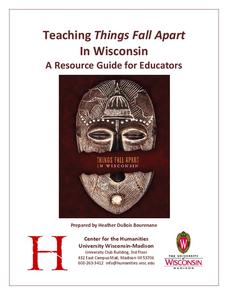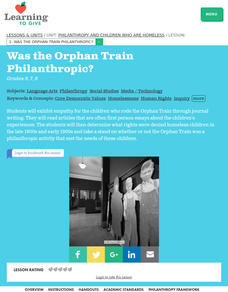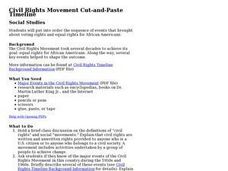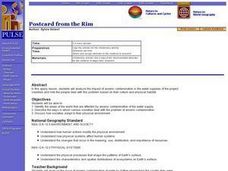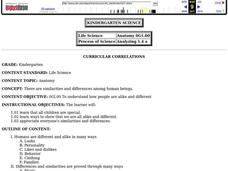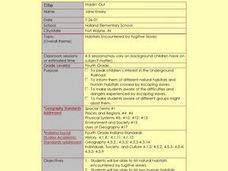Curated OER
Walking for Water Mini-Unit
Pupils participate in an activity that requires them to consider the availability of water. In this "walking for water" lesson, students read "Women Bear the Weight of Water," and respond to discuss questions regarding the article....
Curated OER
Left Brain vs. Right Brain -- Which Side Are You On?
High schoolers examine the different regions of the brain and what they are responsible for. They decide whether they are right or left- brain dominant based on their personalities.
Curated OER
Mobile Phones
Investigate how mobile phones impact their lives through this technology instructional activity that has students discuss the history of the cell phone and research how cell phones are being used in third world countries. Students create...
University of Wisconsin
Teaching Things Fall Apart in Wisconsin: A Resource Guide for Educators
“There is no story that is not true, . . .” And uncovering the truths in Things Fall Apart is the focus of a 68-page resource packet designed to provide instructors with a wealth of materials that enhance understanding of Chinua Achebe’s...
Curated OER
Making Democracy Work for Everyone, 1877-1904
Students investigate the culture of the post Reconstruction South. They participate in a jigsaw research activity, conduct Internet research on an assigned topic, and write a report to present to the class.
Curated OER
The Sixties Protests and Social Change
Students identify, examine and analyze photographs of the sixties to determine the forces of social change at work in America during this decade. They determine the goals of each movement and the methods used by each to achieve those goals.
Curated OER
Racial Violence in America: Lynchings, 1877 to 1920
Students are introduced to the concept of lynching as it took place in the American South in the late 19th and early 20th centuries. Through class discussion and a review of lynching photographs, students explore the reasons behind...
Curated OER
The Right Ideas
Students investigate the Bill of Rights and explain how non-profit organizations take care of those rights. In this Bill of Rights lesson, students work in groups to look at the rights that are included in the Bill of Rights. They...
Curated OER
Philanthropy And Children Who Are Homeless Lesson 2: Was the Orphan Train Philanthropic?
Learners study the lives of homeless children who rode the Orphan Train by reading first person essays of the children's experiences. They examine what rights were denied to the homeless children during the late 1800's and decide whether...
Curated OER
Women: Stride Toward Freedom
Students read facts about women'ts suffrage and research topics related to women's rights. Optional films for viewing and books to read.
Curated OER
In the Struggle for Equality and Justice for All
Students focus on the struggle for minorities rights. They describe the civil rights movement of the late 1950's and the 1960's. They trace the roots of the movement in the second-class treatment accorded many black Americans and...
Curated OER
New Movements For Social Justice: The Latino Struggle for Equal Rights
Students examine myths and stereotypes about Hispanic immigrant groups. They appreciate and share the strengths of their diversity and view films that challenge ideas about education and cultural values. They explore the Latino Rights...
Curated OER
The Reconstruction Period
Young scholars use documents and other resources to evaluate the success or failure of the Reconstruction for giving rights to African Americans. The documents are primary resources with questions included for students to complete.
Curated OER
Civil Rights Movement Cut-and-Paste Timeline
Students put into order the sequence of events that brought about voting rights and equal rights for African Americans. The creative project can be made very crafty by having students cut out the timeline to be combined with others in a...
Curated OER
Antisemitism in Early America
Eleventh graders explore the rise of antisemitism in the United States in the early 20th century. After reading a passage concerning one man's ordeal, 11th graders discuss how the civil rights of minority groups has been viewed in...
Curated OER
Systems of the Body
Third graders gather information by questioning, forming hypothesis, collecting and analyzing data, reaching conclusions and evaluating results, and communicating procedures and findings to others. Then they demonstrate an understanding...
Curated OER
Does It Looks All Right to Me?
Students explore the concept of philanthropy. In this service learning lesson, students examine the accomplishments of Civil Rights leaders' as works of philanthropy. Students read literature regarding diversity and study the Selma to...
Curated OER
Awwwk…..Jim Crow Laws/ Constitutional?
Young scholars examine the constitutionality of Jim Crow Laws. In this civil rights lesson, students read excerpts of the U.S. Constitution as well as examples of Jim Crow Laws. Young scholars select Jim Crow laws and then find out what...
Curated OER
Citizenship
Students discuss and define the term citizenship. In this character education lesson plan, students explore the responsibilities of citizenship in small groups. Additionally, students compare events in history and discuss their personal...
Curated OER
World Geography: Postcard from the Rim
Students are able to identify the areas of the world that are affected by arsenic contamination of the water supply. They are able to describe the ways in which various societies deal with the problem of arsenic contamination. ...
Curated OER
Anatomy
Students explore the similarities and differences in human beings. They consider that all students are special, and appreciate everyone's similarities and differences.
Curated OER
Hidin' Out
Fourth graders draw three major Underground Railroad routes crossing Indiana on an outline map and include habitats and towns. They produce an oral history involving at least three natural habitats and one human habitat.
Curated OER
Changing for the Common Good
Students examine the nonprofit sector and how it has made positive changes in society. They create a timeline noting events related to disadvantaged groups. They work together to research the events.
Curated OER
Through the Past, Lightly
Seventh graders engage in a variety of activities in the study of Native Americans and the times of the early explorers. They create art, write in journals, and study how art influences society.





